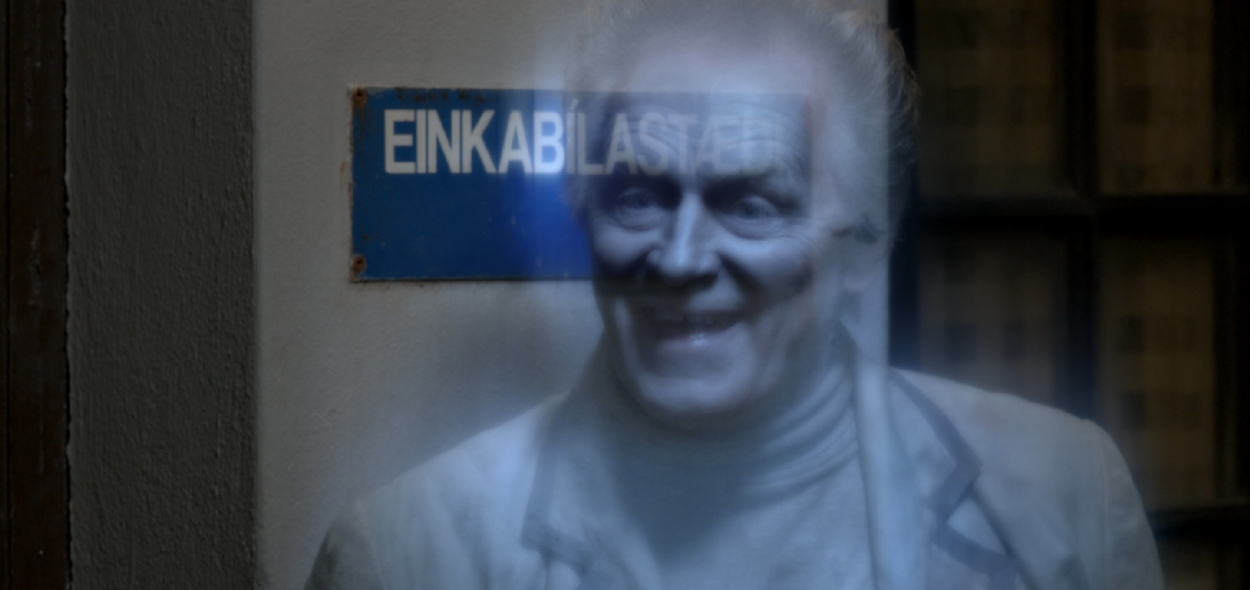
The essence of much well-crafted comedy lies in observation: observation of people, of the kinds of scenarios that they create and of the ways in which they react and interact. The emotional substance beneath the comedic surface draws us in, no matter how absurd, deadpan or surreal the humour. With this in mind, writer/director/producer Ágúst Guðmundsson’s offering Spooks and Spirits (Ófeigur gengur aftur) is an enjoyable enough watch, but never delves deep. Hints of emotional insight within the narrative remain unresolved as the film neither makes good on the tensions it (suitably) sets up, nor establishes a comedic current strong enough to carry the film forward at all times.
In Guðmundsson’s dramedy, protagonist Anna (Ilmur Kristjánsdóttir) and her fiancé, Ingi (Gísli Örn Garðarsson), are looking to sell off their house and move into their dream house – just following the death of Anna’s father, Ofeig (iconic Icelandic entertainer, Laddi). What follows is a madcap string of antics, instigated by Ofeig’s ghostly presence and designed to keep them from moving out of his house. Ingi, the soon-to-be son-in-law, then seeks to retaliate against what he views as a barrier to his life with Anna maturing. The underlying premise of Spooks and Spirits is appealing; it revolves around a twist on the ‘fear of the Unknown’ presented to us in most films with supernatural themes. Rather than the tired and well-worn notion of fearing the afterlife from a living character’s perspective, instead we are presented with Ofeig’s fear of and dismay with the afterlife. At one point, he even implores Anna not to force him to go back to “that horrible, empty place”. Ofeig has lived in that house since he was born, and isn’t ready to depart from a world with those he knows and loves. His ‘fear of the Unknown’ is sparked by an apprehension of moving on, and of fading into obsolescence.
This focus is fresh, intriguing – we’re shown the grief at the loss of a father, but the film sparks a number of thought-provoking questions (even if they don’t tread completely new territory) about our relevance once we pass through to the other side. There is a clear-cut delineation between the life and progress of Ingi and Anna, who are settling down and looking to have kids, and the death of Ofeig, whose proper existence is relegated to the past despite his continual haunting. The comedy is derived from Ofeig’s subsequent stubbornness in not letting go, and presumably it wouldn’t work any other way. Spooks and Spirits entertains in this way, providing the basis for a strong comedy with an undercurrent of pathos and emotional investment in the journey of the characters. Refreshing, too, is the living characters’ discomfort not with the fact of Ofeig’s otherworldly incarnation, but his selfish attempts to hinder their lives.
Guðmundsson builds tension aptly from the film’s beginning, but where the film falters is in its execution of this concept: it does not follow through to the end we anticipate. Its impact suffers as a result. If comedy necessitates a keen eye for observations of people, the observations are there but not fully addressed. Anna, one of the film’s arguable three protagonists, never confronts her father about his continuing to haunt them and thus impede her progressing adulthood and relationship with Ingi. Her presence throughout the vast majority of the film is spent evading the scenarios of conflict that Guðmundsson does an expert job of establishing from the get-go. This only serves to cheapen the narrative, where Ingi’s actions drive most of the clashes between the living characters and the deceased. This isn’t necessarily a bad thing in itself: Ingi taking charge, where Anna is too overcome by heartache to lose her father for the second time, is credible and provides a comic father-in-law/son-in-law dynamic. The film’s proper error of judgment is in not bringing forth the emotional chaos it encourages its audience to expect – especially a scene of confrontation between Ofeig and Anna. To be put tactfully and spoiler-free, this resolution only comes in the last few minutes of the movie – after too much deliberation and meandering in between.
The lack of fulfilment is echoed in other ways, too. Implications about Ofeig’s character as an alcoholic womaniser, the effects of this on his children, his having cheated on their mother continuously – these are all emotionally charged sidenotes that never get fully addressed. Again, the subject of recently deceased relatives presumably pushes these kinds of issues to the forefront, so the absence of proper emotional development seems slightly misguided. Nevertheless, the film retains moments of well-placed insight, including the hologram-like projections of Anna’s childhood memories by Ofeig’s ghost.
Other elements of the film don’t disappoint, however. The actors themselves each make use of great comedic timing and Guðmundsson’s ridiculous comic situations to inspire laughs from the audience. Gísli Örn Garðarsson, as Ingi, shines in particular as the increasingly neurotic son-in-law. The cinematography’s fluid and dynamic moving camera complements the supernatural theme, revolving in elegant ballerina-like turns around characters and swooping round others to emulate the comings and goings of Ofeig the ghost himself.
Overall, Spooks and Spirits doesn’t push its comedy far enough for us to overlook the under-development of its emotional facets. Despite this, Guðmundsson’s film is a pleasant and well-made production with a differing focus that makes its box office success no surprise.
